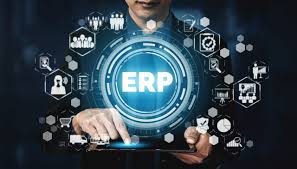5 Trends in ERP for Manufacturing Industry in 2023
ERP systems have become the must-have investment for manufacturing companies. This specific software is known to manage daily activities, including procurement, supply chain operations, risk management, accounting, project management, etc. Moreover, ERP software also provides several business functions, like human capital management, financial management, inventory management, customer management, and so on.
However, choosing the right ERP software for manufacturing and keeping updated on the latest trends is key to successfully implementing this system. The future of ERP software will reflect the future of business. Innovation in the ERP system will enable manufacturing companies to capture more benefits across the value chain. Upcoming ERP trends will be seen as transformational digital technologies and as solutions for innovative ways of working, automating manual operations, and making decisions.
While there will be several innovations in 2023, here highlighted are five trends in the ERP for the manufacturing industry.
- Internet of Things (IoT)
Internet of Things (IoT) is typically a concept tracking real-time data about different tools and automobiles when integrated through cloud-based ERP software. For example, the shop floor in the manufacturing units requires N number of tools and machines for production.
Maintaining these tools and machines is essential to ensure smooth workflow regularly. It can be done by installing sensor devices on the tools and machines to immediately detect a defect and send a request for repair or replacement via ERP systems. The real-time data provided by the ERP software will help manufacturing companies improve asset management, access real-time business insights, better forecasting, and more.
- Cloud Migration
Cloud migration is specifically crucial for mid-sized manufacturing units. Legacy systems and other ERP applications cost a fortune in infrastructure and maintenance. On the other hand, cloud ERP can be easily used with any computer having an internet connection.
Therefore, there is no need for manufacturing companies to recruit IT professionals. Instead, many employees can use subscription-based cloud applications at a reasonable lower and reasonable cost. It is an added benefit for small businesses.
- Two Tier Systems
The two-tier ERP systems are primarily used in mid-sized manufacturing units and businesses operating at multiple locations. The first tier constitutes the legacy system the management can use to manage the company’s master data.
And all other subsidiaries of the same company can use the second tier. Moreover, the software in the second tier is flexible enough to be customized to meet the needs of multiple departments. The maintenance of master data is crucial to prevent duplication in the system. This type of manufacturing ERP software India is in higher demand due to its capability of centralizing the database and ensuring that the data is on track.
- Artificial Intelligence (AI)
Artificial Intelligence (AI) is one of the upcoming trends in the ERP for the manufacturing industry. The algorithms of AI are designed to think and act like human beings, analyzing problems and making decisions. Alexa and Siri are the most common AI tools used these days. These in-built tools can recognize a problem and perform the appropriate action.
Regarding the manufacturing industry, AI in-Built tools integrated with the ERP software can help manufacturing units save more time analyzing enormous amounts of data. AI carries out these tasks and sends notifications through ERP software resulting in a more streamlined and optimized process.
- Mobile Usage
While manufacturing units are implementing cloud ERP systems, mobile ERP is the next on their list. Any shop floor employee can use mobile ERP software anytime to prevent several issues. In addition, line managers can ensure operators adhere to the on-job instructions and production schedules and track the movement of materials in real time, even when off-site.
Concluding Thoughts
In this digitally innovative era, software developers and vendors focus on offering businesses more personalized solutions. Every industry is distinct in terms of operations and challenges. Therefore, companies look forward to acquiring ERP systems tailored to their industry instead of customization to survive the competition.
ERP systems for the manufacturing industry have multiple technologies emerging every year. The trends mentioned above in the ERP for the manufacturing industry will enhance business efficiency. With everything becoming digitized, it’s the need of the hour for companies to adopt new technologies to meet customer demands.



Leave a Reply
You must be logged in to post a comment.